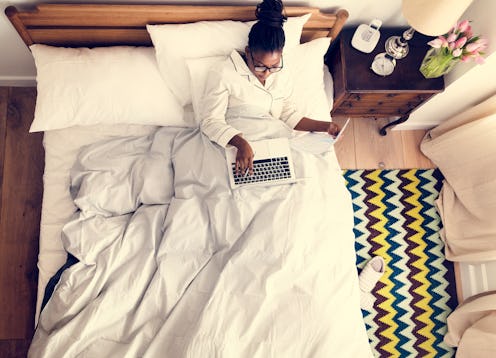
If you're not used to working from home, you may feel like everything's upside down right now. Maintaining a daily schedule and routine can be all the more difficult when you have nowhere to go, and no separation between work and rest. But how does working from home affect your sleep pattern really? Well, in plenty of ways. Here's exactly what to keep an eye on, and how to keep things on track.
How Does WFH Actually Affect Your Sleep?
Let's begin by stating the obvious: working from home in many ways reduces the need for such a rigid bedtime and wake up time, in part because you no longer have a commute to contend with. This often means we get a slight lie in, which sounds great, but it can mess with our bed times too. I can personally attest to the fact that if I know I don't have to get up as early in the morning, I think that's an excuse to stay up later. Hence, your usual routine is shifted.
It can also be hard to wind down and fall asleep at night time, when you've been at home all day. Fresh air, exercise, and social interaction all play a part in helping us to feel 'tired enough' to sleep.
Another factor is the lack of separation between our work and our rest times. "It can be hard enough to switch off from work as it is, but at least with a commute, there is the physical separation from your work computer and home," says Dr Anna Persaud, sleep expert and CEO of This Works.
"Now that our offices are based in our lounges, bedrooms and home offices, that temptation to send just one more email, or just check one more thing can become invasive and create added levels of stress and anxiety — in what is already a stressful and anxiety provoking situation," she continues, before adding that this can "potentially lead to an increase in our Cortisol levels — the stress hormone — which acts as a suppressor to Melatonin — the sleep hormone — making it hard to fall asleep." Excellent.
How To Keep Your Sleep Cycle On Track
Despite there being plenty to worry about here, the good news is there are certain steps you can take in order to maintain a healthy sleeping pattern — and it's really all about routine, routine, routine.
Persaud explains that there is great in importance in maintaining a sense of regularity in all things. "Wake up and go to bed at the same time every day as this helps to regulate our sleep pattern," she recommends. Yes, this may be tempting to break, but if you want to practise healthy sleeping habits, it's definitely up there.
She also insists we must stick to normal working hours, not being tempted to work later in the evening, as this can stop us being able to effectively switch off.
Another thing we can try and maintain is our regular meal times, which Persaud agrees can really help too. Changes to our food routines can really impact our Circadian Rhythm (essentially your body's internal clock), she says. It's like whenever you visit a different country with a very different time difference; our bodies become confused when we start eating meals when we normally wouldn't be used to. Keeping things stable within our diets helps our bodies to maintain a sense of normality and know when bed time and wake up time should be.
As well as routine, Persaud expresses how key it is to keep stress levels down as much as possible in order to sleep effectively. Cortisol, the stress hormone, is know to impact our sleep, meaning it's crucial to find ways to keep it down. This can understandably be tough during this stressful time, but there are ways you can help yourself, namely by exercising. Working out is a great time "to get rid of my excess cortisol, which you need to burn off if you want to avoid feeling agitated and stressed," says Persaud.
She also recommends limiting screen time, practising mindfulness, and being kind to yourself to keep that stress down.
When it comes to bedtime, if you're still having issues switching off, the old classics really still do have merit. Staying away from your phone two hours before bedtime, taking a bath and winding down with a hot drink can all help with winding down, as can a relaxing pillow spray. I love the Jo Malone London Lavender & Musk one, as well as the classic This Works version.
In short, sticking to your routine and attempting to suppress excess stress really can help you to keep your sleep patterns on track while working from home.